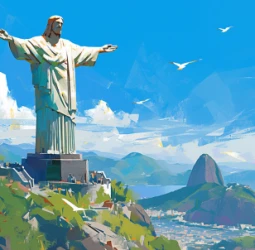Brazil is a country known for its vibrant culture and lively spirit, and one aspect that truly represents this is its festivals. From colorful parades to traditional rituals, Brazilian festivals showcase the rich diversity and heritage of this South American nation. These festivals not only bring people together but also serve as a way to preserve and celebrate the country’s traditions.
Brazilian festivals are a significant part of the country’s cultural calendar, with numerous events taking place throughout the year. Some of the most famous festivals include Carnival, Festa Junina, and Folia de Reis. Each festival has its unique history, traditions, and cultural significance.
The most famous and most anticipated festival in Brazil is, without a doubt, Carnival. This annual celebration takes place before Lent, the Christian period of fasting and prayer leading up to Easter. It is a time when people indulge in extravagant parades, lavish costumes, and lively street parties. The Carnival in Rio de Janeiro, one of the largest and most famous in the world, attracts millions of visitors from around the globe. The festivities involve samba dances, elaborate floats, and extravagant costumes adorned with feathers and sparkles. The celebration also includes competitions between different samba schools, with each showcasing their unique cultural influences.
Another popular festival in Brazil is Festa Junina, or June Festival, which celebrates the country's rural traditions. It takes place in the month of June and is a homage to Saint John, the patron saint of rural communities. This festival is filled with colorful decorations, traditional food, and folk music. People dress in traditional peasant clothing, and the festivities include dance performances and games such as the “quadrilha,” a traditional square dance. The festival also serves as an opportunity for people to gather and celebrate the bountiful harvest of the year.
Folia de Reis, or Three King’s Festival, is a religious festival that takes place in January. It combines elements of Christianity and Afro-Brazilian traditions and is celebrated in honor of the three wise men who visited Jesus after his birth. This festival is a representation of the country's religious diversity and is celebrated with processions, music, and dance. People dress up as the three kings, and the festival also includes traditional dishes like “bolo de reis,” a fruitcake filled with figs, nuts, and spices.
Aside from these major festivals, Brazil also hosts various regional and local cultural festivals throughout the year, such as the Lavagem do Bonfim in Bahia and Oktoberfest in Blumenau. These festivals highlight the distinctive culture and traditions of different regions in Brazil, adding to the country's diversity and charm.
There is no denying that Brazilian festivals are a significant part of the country's identity. They not only bring people of different backgrounds together but also provide a platform for preserving and promoting Brazil's cultural heritage. These festivals also attract tourists from all over the world, providing a boost to the country's tourism industry.
In addition to their cultural significance, Brazilian festivals also have a significant economic impact. The Carnival in Rio de Janeiro alone generates millions of dollars in revenue, providing job opportunities and boosting the local economy. This economic impact extends to the vendors, artisans, and small businesses involved in these festivals, contributing to the country's overall development.
In conclusion, Brazilian festivals are a celebration of the country's vibrant culture, diversity, and spirit. They showcase the unique traditions and customs that make Brazil such a fascinating and dynamic nation. These festivals are not only a source of entertainment but also serve as an important means of preserving and strengthening Brazil's cultural heritage for future generations to come. Whether you are a local or a tourist, experiencing a Brazilian festival is a must-do to truly understand and appreciate the country's rich culture and traditions.
Brazilian festivals are a significant part of the country’s cultural calendar, with numerous events taking place throughout the year. Some of the most famous festivals include Carnival, Festa Junina, and Folia de Reis. Each festival has its unique history, traditions, and cultural significance.
The most famous and most anticipated festival in Brazil is, without a doubt, Carnival. This annual celebration takes place before Lent, the Christian period of fasting and prayer leading up to Easter. It is a time when people indulge in extravagant parades, lavish costumes, and lively street parties. The Carnival in Rio de Janeiro, one of the largest and most famous in the world, attracts millions of visitors from around the globe. The festivities involve samba dances, elaborate floats, and extravagant costumes adorned with feathers and sparkles. The celebration also includes competitions between different samba schools, with each showcasing their unique cultural influences.
Another popular festival in Brazil is Festa Junina, or June Festival, which celebrates the country's rural traditions. It takes place in the month of June and is a homage to Saint John, the patron saint of rural communities. This festival is filled with colorful decorations, traditional food, and folk music. People dress in traditional peasant clothing, and the festivities include dance performances and games such as the “quadrilha,” a traditional square dance. The festival also serves as an opportunity for people to gather and celebrate the bountiful harvest of the year.
Folia de Reis, or Three King’s Festival, is a religious festival that takes place in January. It combines elements of Christianity and Afro-Brazilian traditions and is celebrated in honor of the three wise men who visited Jesus after his birth. This festival is a representation of the country's religious diversity and is celebrated with processions, music, and dance. People dress up as the three kings, and the festival also includes traditional dishes like “bolo de reis,” a fruitcake filled with figs, nuts, and spices.
Aside from these major festivals, Brazil also hosts various regional and local cultural festivals throughout the year, such as the Lavagem do Bonfim in Bahia and Oktoberfest in Blumenau. These festivals highlight the distinctive culture and traditions of different regions in Brazil, adding to the country's diversity and charm.
There is no denying that Brazilian festivals are a significant part of the country's identity. They not only bring people of different backgrounds together but also provide a platform for preserving and promoting Brazil's cultural heritage. These festivals also attract tourists from all over the world, providing a boost to the country's tourism industry.
In addition to their cultural significance, Brazilian festivals also have a significant economic impact. The Carnival in Rio de Janeiro alone generates millions of dollars in revenue, providing job opportunities and boosting the local economy. This economic impact extends to the vendors, artisans, and small businesses involved in these festivals, contributing to the country's overall development.
In conclusion, Brazilian festivals are a celebration of the country's vibrant culture, diversity, and spirit. They showcase the unique traditions and customs that make Brazil such a fascinating and dynamic nation. These festivals are not only a source of entertainment but also serve as an important means of preserving and strengthening Brazil's cultural heritage for future generations to come. Whether you are a local or a tourist, experiencing a Brazilian festival is a must-do to truly understand and appreciate the country's rich culture and traditions.



 admin
admin















